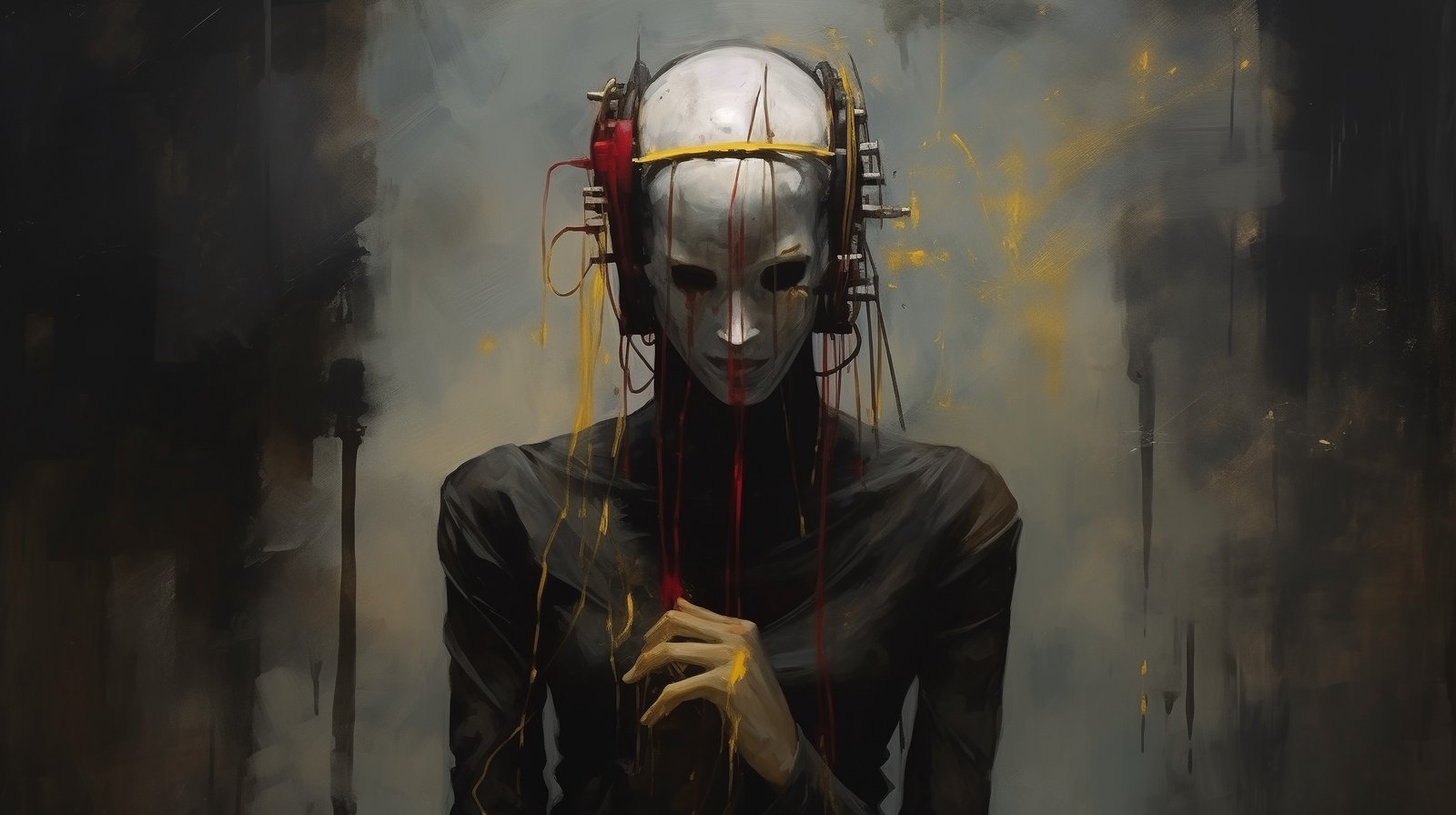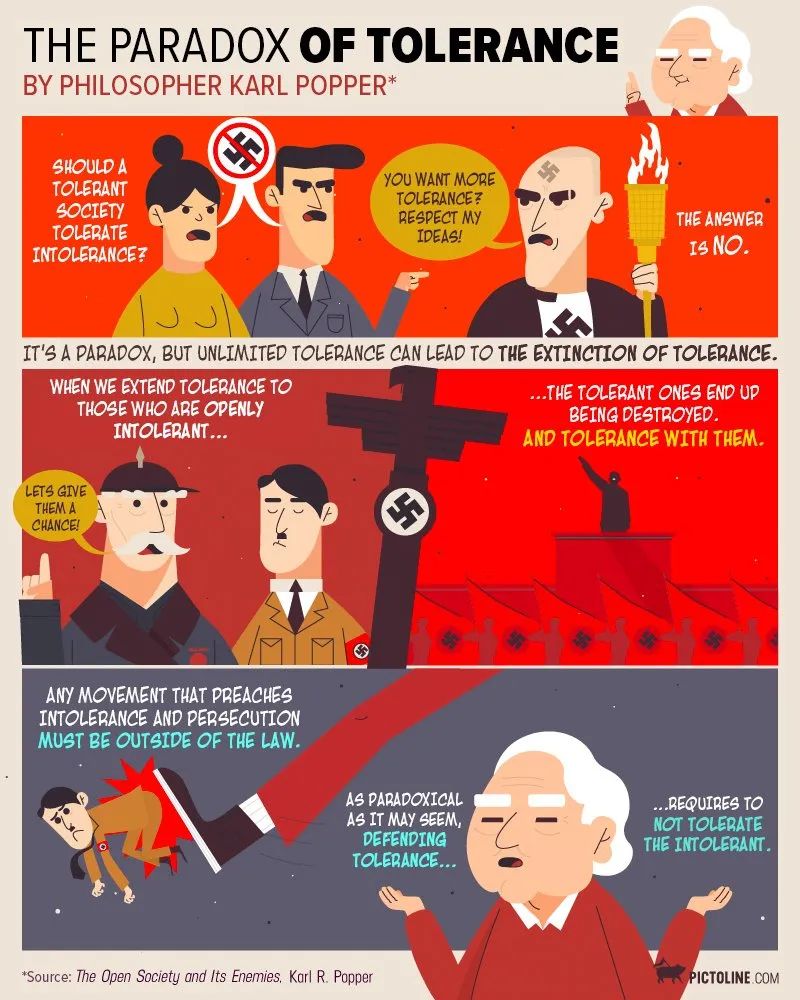
1. Accelerationism as a philosophico-political framework
1.1. Liberalism and Accelerationism
The short version is that Nick Land is a right-accelerationist neo-reactionary: an economic hyper-liberal. Which means that in order to truly understand his overarching philosophy we need to first understand his particular version of (hyper) liberalism - what accelerationism means for him.
We can start by invoking Schmitt’s conceptualization of liberalism (and its corrolary, rationalism) as the desire to suspend decision-making and replace it with an “endless conversation”. Liberalism avoids fixity, certainty, definition, qualitative breaks - on a linguistic level this is the endless sliding and free-floating of signifiers, on an epistemological level this is Popper’s falsificationist doctrine where nothing is really true, just not-false with a level of certainty that asymptotically approaches 100% (but never really reaches it, this is what epistemologists mean by the problem of induction). Libidinally, this is the free-flowing desire of the BwO, making and unmaking connections according to the need of the present moment, hence Schizophrenia as a concrete incarnation of liberated desire (zero anti-production).
Liberalism, for better or for worse, is incapable of totalizing - inserting a despotic figure into the network of relations that stabilizes flows (of desire, meaning, information, production…), which is why it (paradoxically) seeks to construct elaborate systems of rules, regulations that enforce themselves. Liberals try to make the decision a natural outgrowth of the conversation (”Now that we’ve thoroughly discussed this and reached a consensus, we can proceed with a course of action”), rather than a transcendent imposition (”Enough talk, it’s time to sort this out!”).
That said, not all movement is the same - and just as free-flowing desire can indeed open up the perpetual self-overcoming of Nietzsche’s Overman (forward movement) it can also end up in a circular movement “in service of fixity – a higher-level stasis, or state” - the classic obsessional spiral. This is (likely) because the lack of an explicit “despot” or positive totalizing point tends to inevitably give rise to a negative one: liberal sytems tend to orbit around a void: that which must not be desired, symbolized, known, enjoyed or produced.
In other words, much of the obsessional spiraling of liberalism is strictly in service of keeping the central prohibition intact:
- Inflation is actually good for the economy (and its cause is certainly not fiat currency & money printing),
- there is no “scientific evidence” for race differences and sex differences;
- the trans-woman doesn’t have a penis,
- endogamy is not good for genetic quality etc.
Notice all these prohibitions, they necessarily arise because the social field needs some repression to organize itself.
Another interpretation is that this is caused precisely by the mutually exclusionary tendencies of various liberalisms: you cannot have both economic and social liberalism, for example, because they run exactly contrary to eachother. The “paradox” of modern society is that you can’t have a “free market” if you’re simultaneously trying to finance DEI initiatives so that everyone gets a seat at the “free market” table. The paradox is of course the point (it’s a feature, not a bug), since this contradiction is what can fuel the continual transfer of wealth from the productive portion of society to the welfare class, while the top lives off of manufactured money and prestige.
The important question now is how to position Land in relation to this?
- If the contemporary liberal is an obsessional trapped between his devotion to “liberty” and the leftist prohibitions that invade the void at its center…
- Land hystericizes the liberal obsessionalism and takes liberalism completely seriously - to its logical conclusion, becoming a prophet of Capitalism for Capitalism’s sake.
Land is an accelerationist (a “hyper-liberal”): where liberals let be, accelerationists spur on (accelerate the process). He strips “liberalism” of all its moralism (its social liberalism): liberal capitalism good not instrumentally (because it maximizes abundance for everyone), but because the further development of the market process is an end in itself and nothing else matters. This is the logic of Nietzsche’s self-legislation, choosing one’s own values - for Land, Capitalism is the ultimate self-legislator.
If authoritarianism is a despotism of the end (the Schmittian decision takes the form of imposing an outcome, whatever means necessary) and liberalism is the indefinite postponement of subordinating means to end, leading to the exact opposite of the (ostensibly) desired end, accelerationism is a despotism of the means (the Schmittian decision is to follow the means, the process, wherever it may lead - “Deterritorialization is the only thing accelerationism has ever really talked about.”).
In terms of the difference between statement and intent:
- the liberal is trapped in an irreducible gap, because his true intent (end) cannot be stated (means), so his statement obfuscates his intent.
- The authoritarian always says what he meanshe has no reason to hide his true intent, given his absolute power - he conjures through command.
- The accelerationist, on the other hand, always means what he says - there is no deeper meaning beyond what he directly states - he lets the command conjure itself.
In terms of “getting the homeless of the streets”:
- liberals employ reform after reform, increasing the severity of the problem with each subsequent one, because they can’t acknowledge its true source
- authoritarians periodically magic them out of existence, whenever the situation calls for it
- accelerationists simply construct a system that makes homelessness “not a problem”, without regard for the exact outcome
To employ one last metaphor: if the liberal obsessional is a cuck, allowing his hysteric leftist wife to make him “watch” while foreign perverted bulls fuck her [she imposes a concrete prohibition into the void between his two objects of desire, herself as madonna and herself as whore, fusing them in a negative manner], the accelerationist drops the madonna fantasy and affirms (spurs on, accelerates) his “wife’s” inherently libidinal nature, thus engaging in a productive union.
In other words, when Capitalism is no longer pressured by residual moralism (the madonna complex) it can finally hit its libidinal prime.
The only way out of the obsessional trap is to reformulate the complex: instead of two mutually exlusive desires, there is one desire that is amplified by the negation of the other. The whore flourishes when she is freed from expectations of madonna-ism (and vice versa). This is how Land approaches Capitalism.
1.2. Three liberalisms
Furthermore, we need to distinguish the three different liberalisms that instantiate themselves in the modern social field:
- Classical liberalism/libertarianism
- Post World War II neoliberalism
- Contemporary left or woke liberalism
These are three distinct ideologies. Classical liberalism and its contemporary instantiation of libertarianism is a purely economic liberalism: it tries to unchain the economy or the forces of the economy. Even then, libertarianism is to classical liberalism as dogs are to wolves - thoroughly domesticated due to its stubborn refusal to accept conflict as a constituent part of human and natural existence.
Neoliberalism is no longer strictly economic, it is mixed with a globalist ethos of general free flows. Moreover, it is primarily employed in service of maintaining a literal Nation-State of exception. Importantly, the admixture of social liberalism in neoliberalism marked a transition from an ethos of “free exchange” to “free sex (change)”. Last, modern woke or leftist liberalism is no longer concerned with the economic “free market”, but rather with opening up the sexual market. Free desire, rather than free production (and exchange). This makes sense - society at its most basic can be seen as a set of laws around sexuality, meaning social liberalism culminates in free-for-all sex(ual) (ex)change, rather than economic exchange.
Liberalisms of different kinds seem to cancel each other out: social liberalism goes counter to economic liberalism and vice versa. You can’t have free sex if you want bantustans, since free sex (exogamy) breaks the political barriers between self and other. On the other hand, you could also consider the thesis that full-on social liberalism creates a vast intermixed race-class that remains distinct from the actual regime - and so the bantustan is no longer global peripheries, but everything except the regime. This would be the counterpoint to the thesis that different liberalisms cancel each other out.
Regardless, this allows us to reduce liberalism to its unary trait: liberalism in all of these planes is the idea that all arbitrary human judgment, all human preferences should be taken out of the equation. Arbitrage of whatever kind should be performed not by humans, but by certain inhuman processes. In other words, arbitrage should be performed by decentralized social machines [extra-rational systems], not centralized human decision makers [despots].
Liberal capitalism seeks to unchain the economic forces. Liberal leftism seeks to unchain the sexual forces (and their outgrowth, political ones). To quote Hylonomus, A Theory of Democratic Divinity:
Liberalism of any kind—whether of economic, political, or libidinal forces—is most fundamentally an ideology of unchaining complex, suprahuman forces and processes to do what they do unimpeded, of getting humans out of the way, so that the invisible hand can do its work. It is creating a black box for God to live in, which resembles the very structure of how reality itself comes into being—a divine image. The holy task of liberal government is to gatekeep a class of priests responsible for building and maintaining this temple, this machine, this house for ghosts, constructed along the very principles of creation itself.
As an accelerationist, Nick Land takes the ideology of liberalism to its logical conclusion. His thinking is oriented along unchaining this process to perform its computation freely and move wherever it decides to move - this is right accelerationism (R/ACC).
The central difference between liberalism and authoritarianism is (at least in theory) the difference between decentralization and centralization and bottom up versus top down decision-making (put differently, Darwinian teleology of natural selection versus traditional metaphysics). Land’s philosophy thus constantly features an emphasis on bottom up decentralization and a materialist metaphysics as well as the move from transcendence to immanence. That said, I don’t think any right-accelerationist would be opposed to a top-down imposition of accelerationist mechanisms.
1.3. No paradox at all
Land offers another handy critique of stereotypical liberal obsessionalism - this time Popper’s Paradox of Tolerance.

Popper’s “paradox” is a very sloppy argument. In the first place, the paradox is (as always) the point: it’s not that liberals are “forced” into “intolerance” by le evil intolerant nazis, it’s that the only way liberals can rationalize their inability to transcend the “all too human” tendency towards intolerance is by positing an already existing, transcendental order of intolerance that they “must” defend themselves against (the subject presumed to not tolerate). The liberal is always reactive - this is also pointed out by Evola in Metaphysics of War: modern wars are always “wars against war”, negative wars rather than positive wars. Every act of violence is the same - because it can’t stand on its own, it must be portrayed as a reaction against an ontologically-prior act of violence, allowing it to be a mere retaliation out of necessity, rather than positively violent attack.
Land makes this clear in Discrimination, as he ponders how “discrimination” came to signify the ultimate evil:
Differentiation between what is ‘good’ and ‘bad’ requires discrimination. This is a capability no younger than life itself, which it serves as an indispensable function. As soon as there is behavior, there is discrimination between alternatives. One way leads to survival, the other way leads to death. There is nourishment, or not reproduction, or not safety or predatory menace. Good and bad, or the discrimination between them (which is the same thing), are etched primordially into any world that life inhabits. Discrimination is needed to survive.
The reflexive application of discrimination to discrimination allows life to differentiate between good discriminators (successful) and bad discriminators (unsuccessful), producing the meta-judgment that discriminating well is good. This is the genesis of the Right, or Nietzschean master morality:
For the first time, there is a self-conscious ‘Right’. This, at least, is its logico-mythical ur-form. To divide the good from the bad is good. Order, hierarchy, and distinction emerge from an affirmation of discrimination.
The Left, on the other hand, positions itself reactively, in opposition to the “natural” Right (the subject presumed to discriminate):
Because the Left cannot create, it comes second. It presupposes an existing hierarchy, or order of discriminations, which is subverted through a ‘slave revolt in morality’. The formula is simple enough: to discriminate is bad.
As discrimination is bad, so is discriminating well:
Following from this leftist moral perversion, as its second-order consequence, those who do not discriminate (well), but are in fact discriminated against, must be the good. In the new moral order, therefore, to be bad at discrimination is good — or ‘universalist’ — whilst the old (and now ‘evil’) quality of good judgment, based on competent perception of patterns and differences, is the very quintessence of sin.
This, in essence, is the ethos of the contemporary liberal and the impetus behind Popper’s Paradox of Tolerance. It’s not that liberals are tolerant, they merely transpose intolerance to a different plane of existence: rather than tolerating like and excluding unlike, they tolerate those who tolerate and exclude those who don’t. But behind this simple transposition is the more basic motive to disarm and defang the sort of life that can ascend by its own means and enthrone the self-castrating life. The Paradox of Tolerance is just the latest and most “sophisticated” rationalization for the animus that traces its roots to Cain.
We can now move on to examine Land’s influences.
